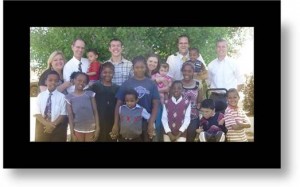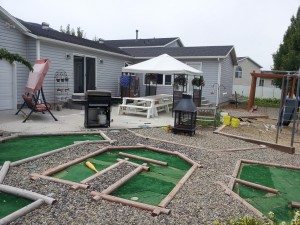BYU EMTs responded to a medical emergency in the middle of Brigham Square on a rainy fall afternoon. The patient could not be moved, so the EMTs did their best to treat him while being drenched by the rain. Sgt. Jeff Strong was soon seen walking out of the Museum of Art carrying a much-needed umbrella.

Strong, the sergeant over MOA security, is often seen serving beyond his job description. When he worked as a patrol sergeant, he would not only give people directions when they were lost, he would take them to their destination, according to dispatcher Cody White. In 2008 Strong received a Brigham Award after White nominated him. White said he nominated Strong because he is an “unsung hero.”
“Any time you’re on a shift with him as watch commander you’re relieved,” White said.
Strong said he became a police officer because he loves diversity and people. His love for people extends into his family life.
Strong is the father of 16 children, with 13 still living at home. Of the 16, the Strongs have adopted 12 children, five of which have special physical needs.
Strong has three children with cerebral palsy, two of whom also have a disorder where the sides of their brains do not communicate with each other. One of these sons has both cerebral palsy and the same brain disorder. He is also legally blind, although Strong said he can actually see pretty well.

One of Strong’s sons is completely blind and is developmentally delayed. His eyes never fully formed, so he has prosthetic eyes. He cannot say very many words, but he does sign, especially when he wants something, Strong said.
Strong’s youngest daughter has the same brain disorder as her two older brothers, though it does not appear to be hindering her development very much.
“Every child has special needs,” Strong said.
Strong said he and his wife never thought they would adopt children, but after their fourth child was born with blood-filled stomach and lungs from a placenta rupture, they knew they couldn’t have any more biological children.
After being told they would never be able to adopt through LDS Family Services because they already had children, they started looking at private adoption agencies. Their first adoption came through an agency with headquarters in a Spanish Fork home.
“When we started adopting we never would have guessed we’d adopt 12 kids,” Strong said.
Strong and his wife have been very open with their children about being adopted. They have books about adoption in their house and make sure their children know adoption is a good thing.
“We tell our children right from the beginning,” Strong said. “We answer age-appropriately for their questions.”
Strong said he has told his children he will help them find their birth parents once they are adults. He said meeting their birth parents before adulthood can be confusing for the children.
One of the most challenging questions the Strongs have faced with their children is how to help their daughter with reactive attachment disorder, or RAD. The disorder makes it difficult for their daughter to form normal, emotional attachments because from a young age, her birth mother would leave her with different caretakers on a daily basis, eventually putting her up for adoption. Her birth father was never in the picture, though, and so she has fewer problems attaching to Strong than to her adoptive mother.
“Some people side-step mental illness, but it’s huge,” Strong said. “It’s huge… the amount of time you put into that.”

The Strongs are building a new house to better accommodate the particular needs of their children. One important change will be the move to a new home. Jackson, their 6-year-old with cerebral palsy, uses a wheelchair, and because their current home is split-level, the Strongs have to carry Jackson up the stairs to bathe him.
“We were either going to break our backs as he gets bigger or we needed a new situation,” Strong said.
Their new house will have a bedroom for Jackson off of the main family area. All doors and hallways on the main floor will be wider than normal to accommodate Jackson’s wheelchair, and the house will have a special shower in the main floor bathroom with a shower chair.
“It will be so nice to not carry Jackson up and down those stairs,” Strong’s wife, Debbie, said.
The Strong family will move into the new house in early 2014. Jeff Strong said it will be 2,000 square feet larger because he and his wife are expecting their first grandchildren in March, and they want to have space for all the family.
Jeff Strong has supported his family through police work for 28 years, with 25 of those years at BYU. The dangers of police work can be hard on a family, but Debbie Strong said the children have not seemed to understand what being a police officer means until they are older.
“It was worth it to me to put up with what I have to if he’s happy,” Debbie Strong said.
Jeff Strong said he tries hard not to bring his work home with him, but sometimes he has to force it. He said he will find things to relieve stress after coming home like playing basketball with his children.
“Sometimes my wife will tell me, ‘You’re acting like a cop,'” Jeff Strong said laughing.




